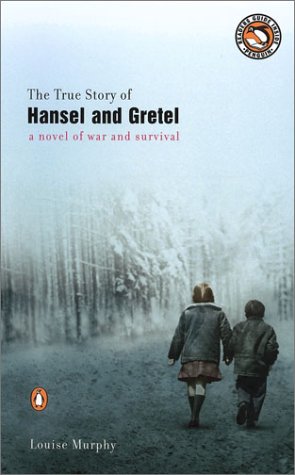The True Story of Hansel and Gretel
fiction, historical, fairy tale retelling
Louise Murphy
Reviewed by: Carrie Byrd
Review posted: 6/11/04
The True Story of Hansel and Gretel s a novel of the Second World War, based loosely on the fairy tale of Hansel and Gretel. Those of you who know me know that I look forward to fairy tale rewrites eagerly. And admittedly, I am predisposed to like them. Perhaps that is a part of the reason that I was so disappointed in this particular book.
For a retelling to be successful, I believe it must offer something new. A new look at the characters. A new view of the world they live in. An interpretation that we haven’t seen before. Louise Murphy has failed to bring anything new to the table. She uses the fairy tale as only a very loose background for the story, to give structure to her tale of war and misery. Even within the structure of World War Two, Murphy has not brought anything new the reader. It is no surprise to find out that war is hell. Its no surprise to find out that people lived hard lives. It is no surprise to find out that the Nazis weren’t good people. But Murphy offers very little beyond those ideas. Stories of war are a lot like fairy tale retellings. If you can’t add something new – or bring a new point of view to light, then what are you offering me as the reader? Its no surprise to find out that people lived hard lives. It is no surprise to find out that the Nazis weren’t good people. But Murphy offers very little beyond those ideas. Stories of war are a lot like fairy tale retellings. If you can’t add something new – or bring a new point of view to light, then what are you offering me as the reader?
I feel that Murphy, like many authors, is capitalizing on people’s fascination with one of the darkest periods of human history. World War Two is an easy target. Everyone who passed elementary history knows enough about it that the author has no need to set up the back story. The level of instant recognition that this period of time evokes allows authors to drag you into the story with no effort.
I would like to see a little effort, myself. In this case, the dependence on history to tell the story was too great. The characters were underdeveloped. Instead of being characters I cared about, I felt I was reading about archetypes. The evil Nazi. The reluctant soldier. The fallen priest. The wise old woman. The innocent children. And so on and so on. Murphy is dependent on our recognition and understanding of these characters, to the point where she has not bothered to develop them beyond that point of recognition.
I also felt that Murphy wasted a lot of my time on trying to make this a “literary” novel. The language is lyric, but filled with wasted words. The delicate, lilting language contrasts with the brutality of the situation sit is describing. But I get the feeling that Murphy spent a lot of time, perhaps too much time, creating that contrast, and it could have been spent on character development. And with the amount of time she spent on the language, she still fails to make what is happening clear on numerous occasions.
There are hundreds of books on World War Two. Read one of them, instead.
|




 Its no surprise to find out that people lived hard lives. It is no surprise to find out that the Nazis weren’t good people. But Murphy offers very little beyond those ideas. Stories of war are a lot like fairy tale retellings. If you can’t add something new – or bring a new point of view to light, then what are you offering me as the reader?
Its no surprise to find out that people lived hard lives. It is no surprise to find out that the Nazis weren’t good people. But Murphy offers very little beyond those ideas. Stories of war are a lot like fairy tale retellings. If you can’t add something new – or bring a new point of view to light, then what are you offering me as the reader?